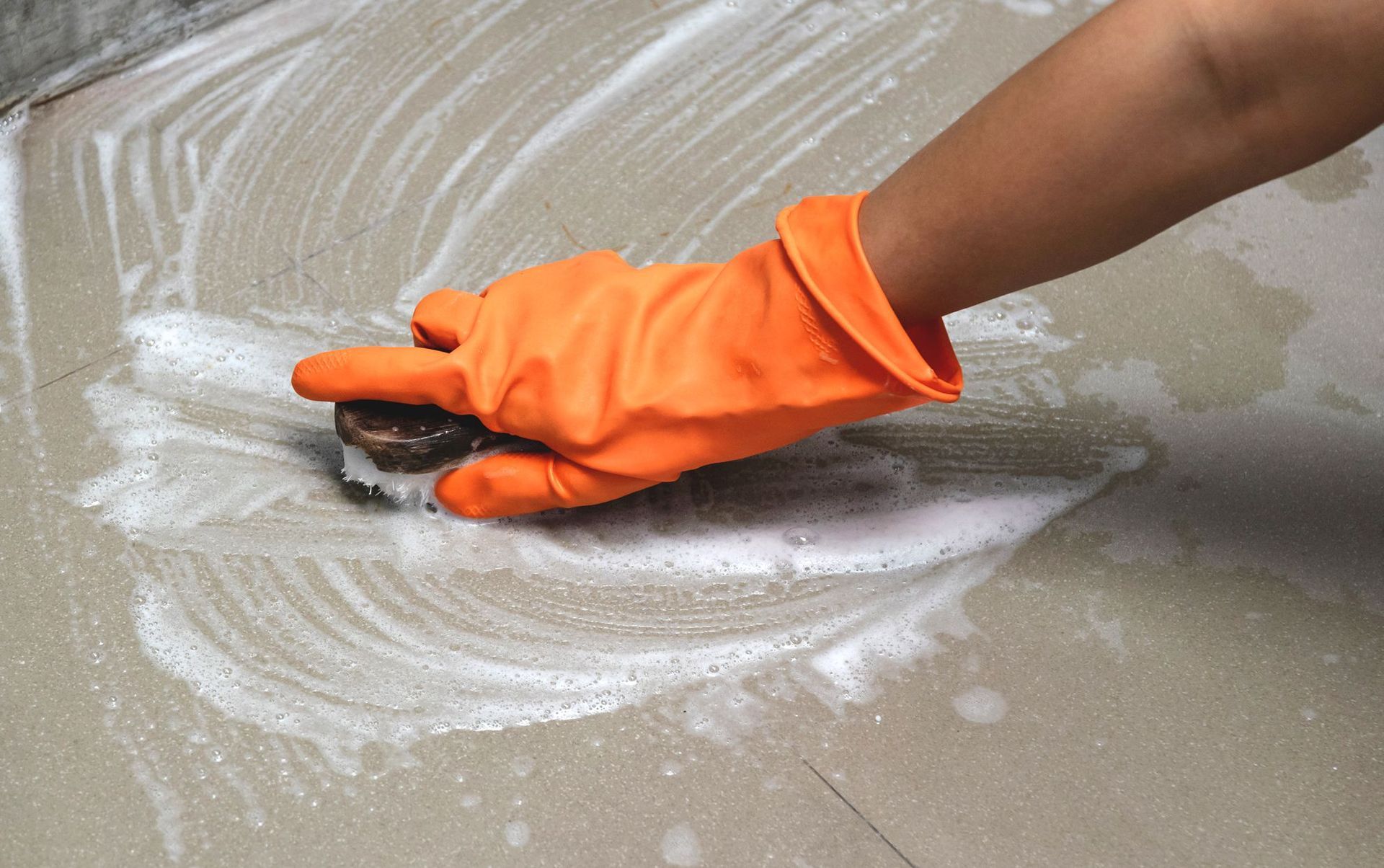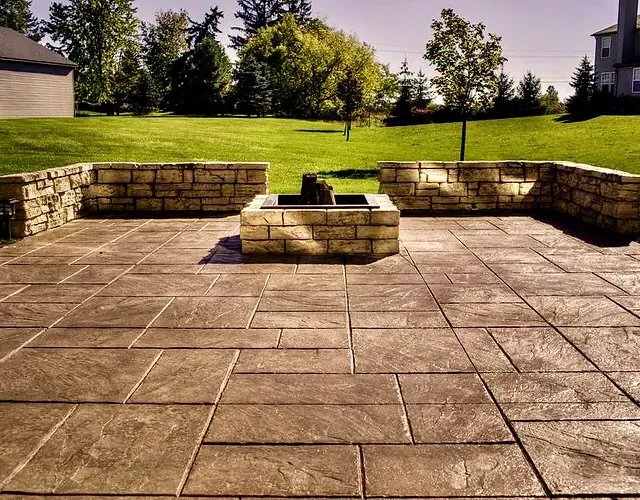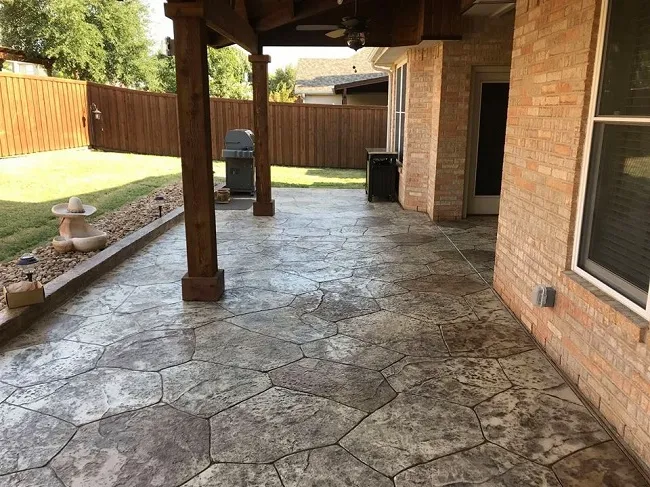Available Now
How to Get Oil Off of Driveway Concrete

To get oil off driveway concrete, you can follow these easy steps. If it's a fresh stain, use dish soap and water. For older stains, try using kitty litter to soak up the oil, or make a paste with baking soda or laundry detergent. Commercial concrete cleaners work well too; just follow the instructions on the label. Another surprising option is WD-40; spray it on, wait for 15-20 minutes, scrub, and rinse. Looking for more comprehensive guides on maintaining and cleaning driveways? Check out this
complete guide on concrete driveways.
- Promptly address oil stains on concrete driveways to prevent visual deterioration and environmental harm. Effective methods for removing oil stains include dish soap and water, commercial cleaners, and WD-40. Are you wondering about other cleaning challenges you might face with concrete surfaces? Here's a helpful resource on
cleaning and stain removal for concrete.
- Effective methods for removing oil stains include dish soap and water, commercial cleaners, and WD-40.
- Choose the appropriate removal method based on the stain's source and age, and test it in an inconspicuous area. If you're interested in other cleaning techniques that involve common household products, here's how you can
clean a concrete driveway using bleach.
- Prevent future oil stains by practicing regular vehicle maintenance and using absorbent mats or trays. While there are numerous methods to tackle these stains, it's essential to pick an eco-friendly approach. Opt for environmentally-conscious cleaning techniques that ensure
responsible disposal when removing oil stains.
- Embrace eco-friendly options and ensure responsible disposal when removing oil stains for environmentally-conscious cleaning. And, if you ever run into stubborn oil patches that refuse to budge, here's a specialized guide on how to get those persistent oil stains off your concrete driveway.
Concrete driveways can add a touch of elegance to your home's exterior, but those unsightly oil stains can quickly turn your beautiful entrance into an eyesore. Whether you're dealing with a recent spill or a stubborn old stain, fear not! In this comprehensive guide, we'll walk you through various methods for removing oil stains from your concrete driveway, catering to both beginners and experienced DIY enthusiasts. Say goodbye to those pesky oil stains and regain your driveway's pristine appearance.
Introduction
Imagine this: You wake up one morning, walk outside, and there it is - a dark, ominous oil stain right in the middle of your pristine concrete driveway. It's an all-too-common problem that many homeowners face. Oil stains can quickly become an eyesore, detracting from your home's curb appeal and reducing the overall aesthetics of your property. But fret not; you don't have to live with those unsightly blemishes forever. In this guide, we'll explore why oil stains are a problem, different methods for removing them, prevention tips, environmental considerations, and much more. Let's dive in and rescue your driveway from those stubborn oil stains!
Why Oil Stains are a Problem

The Visual Impact
Oil stains on your driveway are not just blemishes; they're attention magnets that draw the eye of anyone passing by. They can make your entire property look unkempt and neglected. A pristine concrete driveway is an asset to your home's exterior, and oil stains are the unwanted guests that can tarnish that asset.
Environmental Impact
Beyond their visual nuisance, oil stains can have a significant environmental impact. When it rains, oil can leach into the soil and even find its way into nearby waterways, potentially harming aquatic life and ecosystems. Responsible oil stain removal is not just about aesthetics; it's about protecting the environment.
Why Removing Oil from Concrete is Challenging
Concrete is porous, which means it readily absorbs liquids. When oil seeps into the concrete, it can penetrate deep, making it a stubborn stain to remove. Additionally, oil is a hydrophobic substance, meaning it repels water. This characteristic makes traditional cleaning methods less effective, as water alone won't suffice.
Different Methods for Removing Oil Stains
| Method | Description |
|---|---|
| Dish Soap and Water | Effective for fresh stains, uses soap and water. |
| Cat Litter | Uses absorbent litter to soak up oil. |
| Baking Soda or Laundry Detergent Paste | A paste that breaks down and lifts oil. |
| Commercial Concrete Cleaners | Specialty products for oil stain removal. |
| WD-40 | Lubricant that helps dissolve and remove oil stains. |
Methods for Removing Oil Stains
Now that we understand why oil stains are problematic, let's explore various methods to tackle them head-on.
A. Dish Soap and Water
For fresh oil stains, this simple method can work wonders:
· Start by mixing a generous amount of dish soap with hot water in a bucket.
· Pour the soapy water over the stain.
· Use a stiff brush to scrub the area vigorously.
· Rinse with clean water, and repeat the process if necessary.
Dish soap is effective for fresher stains because it helps break down the oil, making it easier to remove.
B. Cat Litter
Cat litter is an absorbent material that can be a lifesaver for oil stains:
· Cover the oil stain with a thick layer of cat litter.
· Press down gently with a broom to help it absorb the oil.
· Leave the cat litter on the stain for at least 24 hours.
· Sweep away the litter and discard it properly.
Kitty litter works by absorbing the oil from the concrete, but it may not be as effective for older, deeply ingrained stains.
C. Baking Soda or Laundry Detergent Paste
Creating a paste can help break down and lift the oil:
· Mix baking soda or laundry detergent with water to create a thick paste.
· Apply the paste directly to the oil stain.
· Allow it to sit for several hours or overnight.
· Scrub the area with a stiff brush and rinse with water.
This paste is particularly effective for drawing out oil from the concrete.
D. Commercial Concrete Cleaners
Various concrete cleaning products are available on the market. When using these:
· Follow the manufacturer's instructions carefully.
· Apply the cleaner to the stained area and let it sit for the recommended time.
· Use a brush to scrub the stain.
· Rinse thoroughly with water.
Commercial cleaners are formulated to tackle tough stains and can be quite effective.
E. WD-40
Surprisingly, WD-40 can help remove oil stains:
· Spray WD-40 directly onto the stain.
· Allow it to sit for 15-20 minutes.
· Scrub the area with a stiff brush.
· Rinse with water.
WD-40 works by breaking down the oil, making it easier to remove.
Diverse Sources of Oil Stains

It's not just cars that can leave oil stains on your driveway. Other sources, including lawnmowers, motorcycles, and even bicycles with engine or chain lubricants that leak, can contribute to these unsightly stains.
Rain Can Make it Worse
Surprisingly, rainwater can exacerbate oil stains on concrete. When rainwater mixes with oil, it can spread the oil and penetrate deeper into the concrete, making the stain more stubborn to remove. So, addressing oil stains promptly is crucial.
Kitty Litter Magic
Kitty litter isn't just for cats; it's a fantastic absorbent for oil stains. Applying kitty litter to an oil stain can help soak up the oil, making it easier to clean.
Heat Can Set Stains
Extreme heat, such as the sun beating down on an oil stain, can cause the oil to bake into the concrete, making it even more challenging to remove. It's best to tackle oil stains as soon as possible to prevent this from happening.
WD-40 for Removal
Surprisingly, WD-40, known for its lubricating properties, can also help remove oil stains:
· Spray WD-40 directly onto the stain.
· Allow it to sit for 15-20 minutes.
· Scrub the area with a stiff brush.
· Rinse with water.
WD-40 works by breaking down the oil, making it easier to remove.
Tackling Unsealed Concrete
Concrete is porous, which means oil can penetrate deep into its surface. This makes oil stains particularly challenging to remove from concrete surfaces. For polished concrete, oil can be removed using a pH-neutral cleaner. However, for unsealed concrete, the removal process is more complex.
The article suggests a multi-step process for removing oil stains from unsealed concrete. This includes:
· Absorbing as much oil as possible using cat litter or another absorbent material.
· Applying a degreaser to the stain.
· Scrubbing the stain with a brush.
· Rinsing the area with water.
If the stain persists, the article recommends repeating the process or considering a poultice application. It's important to note that the sooner you address the stain, the easier it will be to remove.
Choosing the Right Cleaning Products
The article emphasizes the importance of cleaning oil stains as soon as they occur to prevent them from becoming permanent. It suggests using commercial degreasers for oil stain removal. These degreasers work by breaking down the oils and allowing them to be rinsed away.
For older, more stubborn stains, alkaline cleaners or poultices can be effective. Poultices draw out the stain from the concrete. It's crucial to always test any cleaning method in a small, inconspicuous area first to ensure it doesn't damage or discolor the concrete.
Practical Methods for Oil Stain Removal

The article provides several methods for removing oil stains from driveways:
· Kitty Litter and Cola: Use kitty litter to absorb fresh oil. Then, pour cola over the stain, let it sit overnight, and scrub with a brush.
· Dish Detergent: Apply dish soap to the stain, scrub with a brush, and rinse.
· Baking Soda: Sprinkle baking soda over the stain, scrub with a brush, and rinse.
· Laundry Detergent: Pour powdered laundry detergent over the stain, add water, scrub with a brush, and rinse.
· Commercial Cleaners: There are many commercial cleaners available designed specifically for oil stain removal from concrete.
It's essential to always wear gloves and ensure the area is well-ventilated when using cleaning products.
DIY vs. Professional Cleaning
While DIY methods are effective for many cases, there are scenarios where professional help may be necessary. Here's a comparison to help you decide:
DIY Cleaning
Advantages:
· Cost-effective
· Suitable for fresh or mild stains
· Can be done at your convenience
Disadvantages:
· May require significant effort for stubborn stains
· Limited effectiveness for deep, old stains
Professional Cleaning
Advantages:
· Expertise and specialized equipment
· Highly effective for all types of stains
· Time-efficient
Disadvantages:
· Higher cost
· Scheduling may be required
Consider the severity of the stain, your budget, and your available time when deciding between DIY and professional cleaning.
Tips for Preventing Oil Stains
| Measure | Description |
|---|---|
| Regular Vehicle Maintenance | Maintaining vehicles to minimize oil leaks. |
| Absorbent Mats or Trays | Placing mats or trays under vehicles to catch drips. |
| Sealing Your Driveway | Applying sealant to make the concrete less porous. |
| Immediate Cleanup | Promptly addressing spills to prevent oil seepage. |
| Designated Parking Areas | Allocating specific parking spots to minimize oil exposure. |
Prevention is always better than cure. Here are some tips to help you avoid future oil stains on your driveway:
· Regular Cleaning: Perform routine cleaning and maintenance on your vehicles to minimize oil leaks and spills.
· Use Mats or Trays: Place absorbent mats or trays under vehicles to catch oil drips.
· Seal Your Driveway: Consider sealing your concrete driveway, as this can make it less porous and more resistant to oil penetration.
· Immediate Cleanup: If an oil spill occurs, address it immediately to prevent it from seeping into the concrete.
· Designated Parking: Designate a specific parking area for vehicles to reduce oil exposure on the driveway.
Case Studies and Success Stories
Let's take a moment to share some real-life success stories:
· Susan's Quick Cleanup: Susan, a homeowner, noticed a fresh oil stain from her lawnmower. She used the dish soap and water method and was amazed at how easily it came off.
· Mike's Cat Litter Trick: Mike had an old oil stain from his car. He applied cat litter and left it for two days. After sweeping it away, the stain was significantly lighter.
· Jane's Commercial Cleaner: Jane had a stubborn oil stain from her motorcycle. She opted for a commercial concrete cleaner and was thrilled with the results – her driveway looked brand new.
Environmental Considerations
As you work on removing oil stains, it's important to consider the environment:
· Eco-Friendly Options: Look for eco-friendly cleaning products or homemade solutions that minimize harm to the environment.
· Responsible Disposal: Properly dispose of used materials, such as cat litter or cleaning agents, according to local regulations.
Additional Tips and Tricks
For those truly stubborn stains, here are some extra tips:
· Pressure Washing: Consider renting or buying a pressure washer to blast away tough oil stains.
· Heat and Steam: Applying heat or steam to the stain can help loosen the oil for easier removal.
· Degreasers: Some heavy-duty degreasers are designed specifically for oil stain removal.
· Safety Precautions: When using cleaning agents, wear appropriate safety gear such as gloves and eye protection.
Conclusion
In conclusion, removing oil stains from your concrete driveway is a manageable task with the right knowledge and techniques. Whether you opt for DIY methods or seek professional assistance, remember that prompt action is key. Don't let those pesky oil stains mar the beauty of your home; take action today and restore your driveway to its pristine glory. With the variety of methods and tips shared in this guide, you're well-equipped to tackle oil stains and keep your driveway looking its best.
Additional Resources and References
In our quest to banish oil stains from concrete driveways, we've gathered valuable insights and expertise from trusted sources such as Craftsman Concrete Floors, Concrete Network, and Allstate. Let's dive into the knowledge pool to achieve driveway perfection.
https://www.craftsmanconcretefloors.com/how-to-remove-oil-stains-from-concrete/#:~:text=Concrete
https://www.concretenetwork.com/fix-concrete-cleaning/removing-embedded-oil.html
https://www.allstate.com/resources/car-insurance/how-to-remove-oil-from-driveway
FAQs
Q1: How can I remove dried oil stains from my driveway concrete?
Dried oil stains can be tougher, but you can try using a combination of methods like a commercial cleaner or a baking soda paste to break down the oil.
Q2: Is there a specific method for getting oil off of driveway concrete in Australia?
The methods mentioned in this guide are applicable in Australia or any other location. However, always consider local environmental regulations and safety guidelines.
Q3: What's the best way to remove old oil stains from a concrete garage floor?
Old oil stains may require a combination of methods, such as using a commercial cleaner or a pressure washer, to effectively remove them.
Q4: Are oil stains permanent on concrete, or can they be completely removed?
While some older and deeply ingrained stains may be challenging, many oil stains can be effectively removed with the right methods and persistence.
Q5: Can you provide tips on removing oil stains from an asphalt driveway?
Oil stains on asphalt driveways can be removed using similar methods, such as cat litter, baking soda paste, or commercial cleaners. However, consider the specific needs of asphalt surfaces when choosing a method.
GET IN TOUCH
Need more information? Speak to one of our experts and get personalised advice on your project to bring your vision to life. Contact us today to schedule your consultation or request a free consultation.
Contact Us
Thank you for submitting a quote request. We'll get back to you shortly!
Oops, there was an error in sending your message.
Please try again later.
YOU MIGHT ALSO LIKE...
YOU MIGHT ALSO LIKE...



Call Now For a Fast & Free Quote
We can be contacted 24/7 via email or telephone
Location
City Council of Ballarat and Surrounding Areas
Call
Ballarat's Best Concreters since 2010.
This is a referral website, please visit our Privacy Policy for more information.
Navigation
Services
Working hours
- Mon - Sun
- -
Give us a call and if we cannot get to you straight away, one of our specialist will call you back shortly.
All Rights Reserved | JM Ballarat Concreters
New Paragraph


